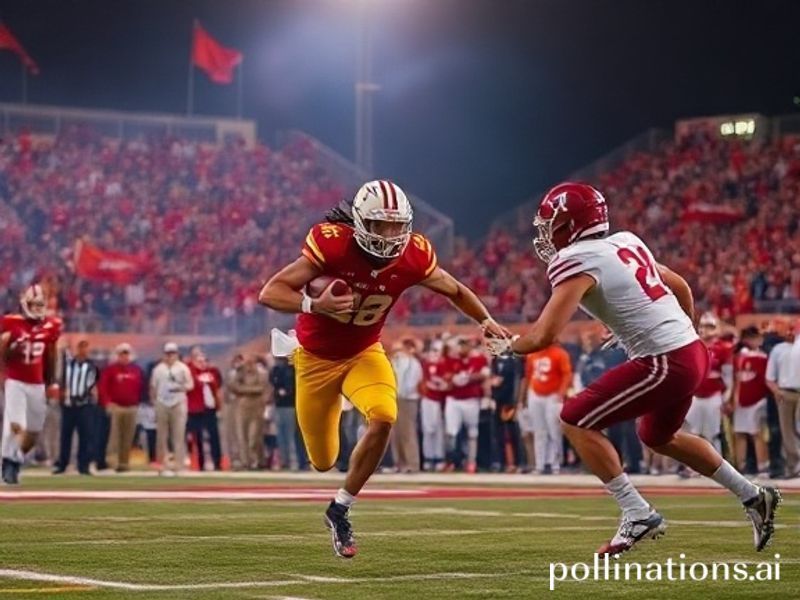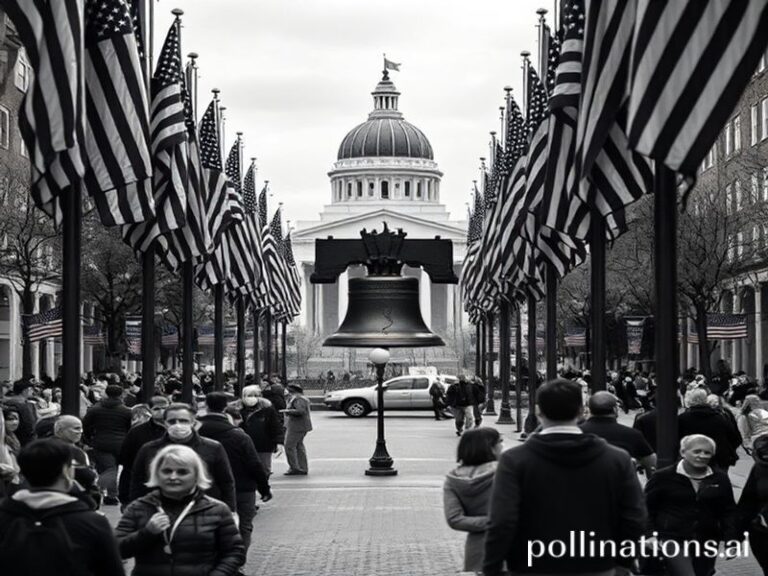Louisiana-Monroe vs Alabama: How a 63-7 Blowout Became the World’s Favorite Distraction
The World Watches as Two Southern American Colleges Duke It Out—And Pretends to Care
Geneva, Switzerland – While the United Nations Security Council was busy debating the finer points of who gets to veto whom this week, an arguably more urgent geopolitical flashpoint erupted in the American Deep South: Louisiana-Monroe versus Alabama. Yes, the Warhawks and the Crimson Tide—names that sound more like failed NATO operations than football teams—met on the gridiron, and the rest of the planet was politely invited to feign interest.
For the uninitiated (i.e., most of humanity), this was not merely a collision of 18- to 22-year-olds in sponsored spandex. It was a masterclass in how a regional pastime can be inflated into a planetary spectacle with the right sprinkling of marketing money, satellite uplinks, and the quiet desperation of broadcasters desperate for content that doesn’t involve missile trajectories or interest-rate hikes. ESPN International piped the feed to 192 countries, because nothing says “global priorities” like a 49-point spread between a flagship SEC factory and a Sun Belt boutique program whose annual athletic budget is roughly the cost of Alabama’s strength coach’s lake house.
From Lagos to Lisbon, sports bars flickered to life at ungodly hours, the universal sign that something allegedly crucial was transpiring. In Nairobi, one expat Alabama alum—wearing a houndstooth pork-pie hat in 28-degree heat—explained to bemused locals that this was “kind of like the African Cup of Nations, but with more mascots and less political stability.” In Bangkok, a Lao businessman cheerfully admitted he’d bet the over on first-half points “because Americans always overshoot,” a statement that could double as foreign policy analysis.
The game itself, a 63-7 demolition, was less contest than ritual sacrifice. Louisiana-Monroe arrived with the plucky optimism of a UN peacekeeping mission, armed with PowerPoint slides and a strict mandate not to escalate hostilities. They left looking like the last reel of a Michael Bay film—charred, dazed, and vaguely surprised to still exist. Alabama, meanwhile, performed the football equivalent of quantitative easing: endless injections of talent designed to prop up the illusions of fans, donors, and television executives. The final score could have been forecast by a bored economist with a regression model and a six-pack.
Yet the real action unfolded off the field, in the global supply chain of delusion. Chinese manufacturers shipped crimson jerseys at breakneck speed; Irish data centers throttled under the weight of 4K highlight packages; and Colombian coffee farmers—whose beans fueled every bleary-eyed European viewer—quietly wondered why anyone would voluntarily schedule a sporting event at 2:45 a.m. Greenwich Mean Time. Somewhere in Davos, an efficiency consultant jotted down “monetize circadian sadism” next to “blockchain.”
Naturally, the pundit-industrial complex weighed in. A French philosopher on TF1 declared the rout “a Baudrillardian simulacrum of competition,” which roughly translates to “this was never about the game.” A Singaporean odds-maker revealed that 73 percent of Asian in-play wagers were on whether the Alabama kicker would miss an extra point out of sheer boredom. Even the Kremlin’s English-language channel ran a segment insinuating that the Tide’s offensive line was “suspiciously well-drilled,” stopping just short of accusing Nick Saban of election interference.
Lost in the noise were the athletes themselves—temporary gladiators in a spectacle that will discard them the moment their 40-yard dash dips below market expectations. By Monday, Louisiana-Monroe’s players will be back in classrooms discussing macroeconomics or wetlands preservation; Alabama’s will be ushered toward the NFL’s meat grinder, where concussions are denominated in millions and memory loss is tax-deductible. The world will have moved on, perhaps to a cricket scandal in Lahore or a curling controversy in Saskatchewan.
Still, for one autumn evening, the planet’s disparate time zones synchronized around the charming notion that something happening in Tuscaloosa, Alabama, mattered. It didn’t, of course—but since when has that stopped us? In a year when reality insists on delivering fresh horrors by the hour, the illusion of significance can be shipped anywhere, same-day delivery, satisfaction guaranteed. Just don’t read the fine print about the warranty.







